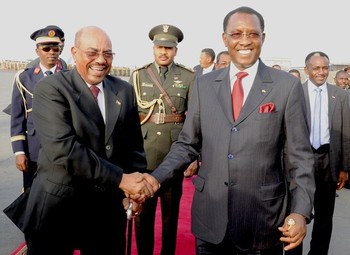Chad urged to execute arrest warrant against Sudanese leader
March 15, 2013 (KHARTOUM) – Human Rights Watch (HRW) has called on the Chadian government to arrest Sudanese president Omar al-Bashir of Sudan or bar him from entering Chad.

Al-Bashir is sought by the International Criminal Court (ICC) for genocide, crimes against humanity, and war crimes he allegedly masterminded in Sudan’s western region of Darfur.
Chad, an ICC member, has already received Bashir three times, most recently in February when it hosted a summit for the community of Sahel-Saharan States (CEN-SAD).
“STAND WITH VICTIMS”
“Chad should join the many African countries that have said they’ll arrest al-Bashir or prevent his visits,” said Elise Keppler, senior international justice counsel at HRW.
“Activists across Africa have called for Chad to stand with victims and to ensure that the Sudanese president is surrendered to the ICC for prosecution”, she added.
HRW said that as a member of the ICC, Chad is obligated to cooperate with the court in the surrender of fugitives.
However, Chad maintains it is simply abiding by an African Union (AU) decision urging member states not to cooperate with the ICC in apprehending the Sudanese leader, though several countries did not abide by it.
HRW insisted that under international law, AU decisions cannot negate Chad’s obligations as an ICC member.
“Chad’s international treaty obligations cannot be wiped away by an AU decision. Chad should arrest al-Bashir, not welcome him”, Keppler said.
At its January summit in Addis Ababa, the AU omitted the usual mention of its resolution urging its members to ignore ICC warrant against Bashir. A source told Sudan Tribune that African diplomats did not believe this was a pressing issue warranting discussion this time around.
The AU’s stance has enabled al-Bashir to visit African ICC signatories such as Kenya, Djibouti, Malawi and Chad without incident, despite an outstanding arrest warrant issued for him by the Hague-based court in 2009. Both Malawi and Kenya cancelled return visits following international pressure.
Chad is the only ICC member to allow al-Bashir to visit multiple times, with the country subsequently reported to the United Nations Security Council (UNSC) for non-cooperation, along with other ICC members who received al-Bashir.
The UNSC chose to take no action against these nations, while the AU issued a resolution backing the decision of these countries to allow al-Bashir’s visit.
DIRE SITUATION
In a statement released on Thursday and extended to Sudan Tribune, Amnesty International called on the UNSC to step in should the Chadian government once again fail to arrest al-Bashir.
Amnesty International’s Africa programme director, Netsanet Belay, said the people of Darfur deserved justice and recognition for their suffering, saying that 10 years on the human rights situation on the ground remains dire, with civilians continuing to face attacks from government forces, pro-government militias and armed opposition groups.
“For the last 10 years, the people of Darfur have endured killings, kidnappings, sexual violence and looting. And while many incidents are reported to the police, perpetrators are rarely convicted,” Belay said.
“For the human rights situation in Darfur to improve, impunity for perpetrators of war crimes, crimes against humanity and human rights violations must end. The Sudanese government needs to deliver indictees to the ICC and the international community should make every effort to arrest president al-Bashir and the other ICC-indictees”, he added.
CHAD URGED TO HONOUR ITS OBLIGATIONS
Close to 100 human rights groups and law societies across Africa signed a letter addressed to Chadian president Idriss Deby urging him to honour his country’s obligations to the ICC in advance of al-Bashir’s previous visit in February.
Signatories said Chad’s continued refusal to act sent “damaging signals to victims of mass atrocities in Darfur and globally, and undermine Chad’s credibility on issues of justice and accountability”.
The European Union also expressed its concerns following the visit, although it stopped short of condemning the Chadian government outright.
During Chad’s thorny relations with Sudan, Deby vowed at one point to execute the arrest warrant against al-Bashir, rejecting African Union (AU) resolutions granting him immunity. However, as relations improved Deby reversed his position.
(ST)
